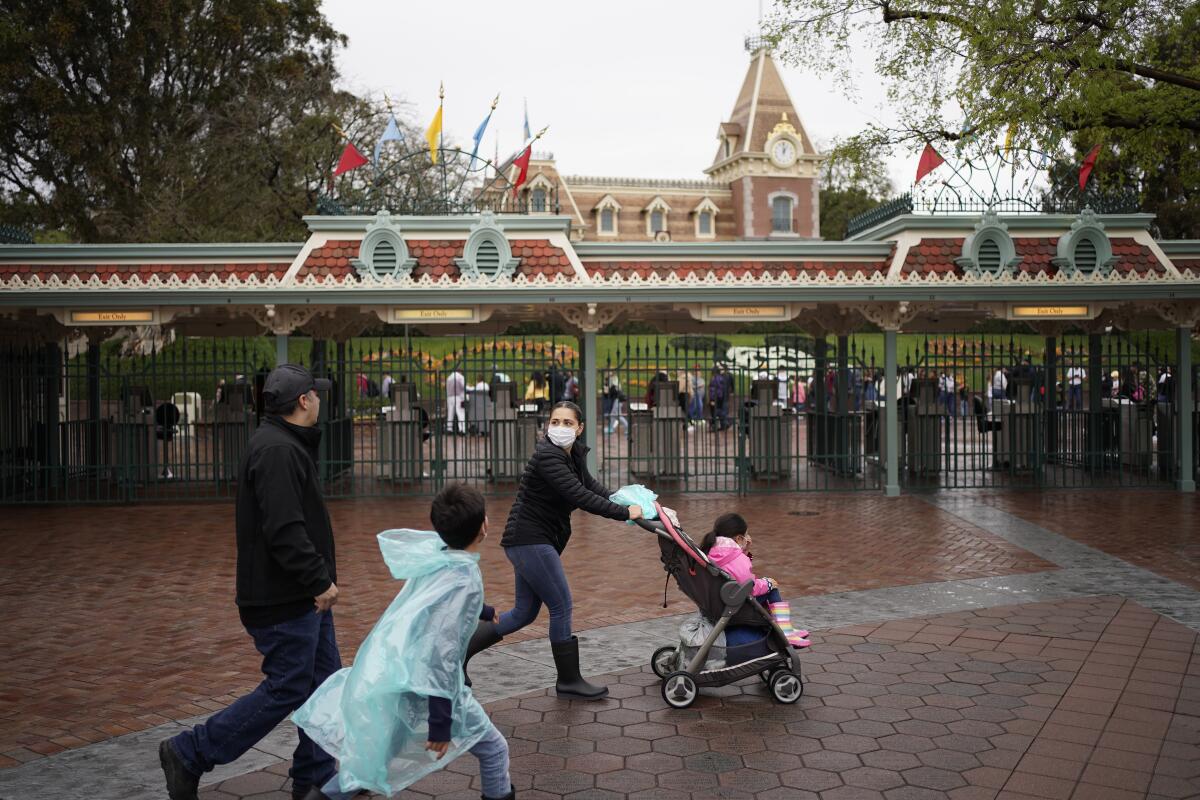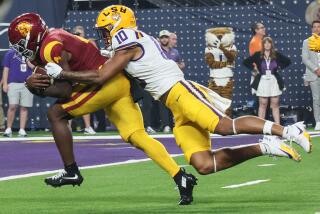Coronavirus reverses Disney’s fortunes, for now

For Walt Disney Co., the novel coronavirus pandemic has brought an extraordinary reversal of fortunes.
The Burbank entertainment giant — long the envy of Hollywood due to assets and brands including theme parks, Marvel, Pixar and sports behemoth ESPN — has been clobbered by the outbreak.
Since late February, when fears over COVID-19 began to seize the stock market, Disney’s stock has tumbled nearly 30%. Other media and entertainment companies, including ViacomCBS, Fox Corp. and Comcast, which has Universal theme parks, have also seen their stocks swoon.
But for Disney, the retrenchment comes after a decade of spectacular gains. Disney’s stock soared more than 400% during the nearly 15 years that Bob Iger served as chief executive, and was trading at $150 a share just four months ago.
After plummeting to $91.81 a share during Thursday’s rout, Disney rallied Friday 12%, or $10.71 a share, to $102.52. The stock market was lifted by President Trump’s declaration of a national emergency due to the coronavirus.
“Disney’s stock has just gotten hammered,” said Jason Moser, senior analyst at the Motley Fool. “The economic impact for the company has been tremendous because it has been hit from all sides.”
Walt Disney Studios on Friday announced it would temporarily suspend production of multiple live-action movies, including “The Little Mermaid,” which was slated to begin shooting in London next week. Marvel’s “Shang-Chi and The Legend of the Ten Rings” has paused shooting in Australia. The film’s director, Destin Daniel Cretton, is in self-quarantine, awaiting the results of a COVID-19 test.
So far, no one has tested positive for the virus, but a studio spokesman said the company was taking the step “after considering the current environment and the best interests of our cast and crew.” The studio had previously announced that it was postponing the theatrical release of the live-action “Mulan,” which was supposed to hit theaters March 27.
The moves follow the company’s dramatic announcement that it would temporarily close its theme parks in the U.S. and Europe, weeks after it shuttered venues in Hong Kong and Shanghai.
The closures and postponements are expected to have a serious impact on Disney’s financial results. The theme parks, experiences and products division brings in more than a third of Disney’s revenue and nearly half of its profits.
The company already estimated a $175-million hit to operating income from shutting down Shanghai Disneyland and Hong Kong Disneyland in late January, assuming two months of closures. Disney Cruise Line departures have also been suspended for the rest of March.
“Disney is very reliant on the parks and experiences side of their business,” Moser said. “And that’s all the stuff that is shutting down. Those businesses represent a big chunk of revenue that Disney won’t be getting back.”
Credit rating agency S&P Global on Friday downgraded its outlook on Disney’s debt rating to “negative” due to the expected impacts of the pandemic. Disney, which took on heavy debt to purchase assets from 21st Century Fox last year, currently has an “A” credit rating from S&P. Disney more than doubled its debt to about $47 billion as of last fall, according to regulatory filings.
“The negative outlook on Disney reflects the increased uncertainty around the impact of the coronavirus crisis on the global economy and specifically how it could affect Disney’s ability to reduce its leverage,” wrote S&P Global analysts Naveen Sarma and Jawad Hussain.
Laura Martin, a Southern California-based media analyst with Needham & Co., added: “It’s unclear when they will be able to reopen the parks, and that’s causing uncertainty among investors.”
In a report, Martin noted that theme parks, television networks and the movie studio are the company’s three big engines and that “COVID-19 is having a disproportionately negative impact.”
However, Martin and other analysts predict that much of the financial impact could be short term. Once the threat of the virus has passed, Disney’s locations in Anaheim, Orlando, Fla., and abroad will probably be filled to capacity again. Disney said in a statement that it will pay its cast members during the closure period.
The crisis could be a tipping point for parts of Disney’s business that are already under stress, such as ESPN and the ABC television network, which has suffered from a flight of viewers to video-on-demand options, including Netflix.
ESPN has been grappling with the effects of consumer cord-cutting. The sports network is distributed in about 84 million homes, down from 100 million a decade ago.
ESPN’s programming plans have been scrambled. All of the major sports leagues, including the NBA, Major League Baseball, Major League Soccer and the National Hockey League have suspended their schedules. ESPN covers the NBA and had plans broadcast the BNP Paribas Open tennis tournament in Indian Wells this week, but the tournament was called off.
“About all that they can do is show highlights of prior events — which is unappealing to most sports aficionados,” said C. Kerry Fields, a clinical finance and economics professor at the USC Marshall School of Business. “SportsCenter and other shows will be somewhat desperate on a day-to-day basis to reinvent themselves.”
Without NBA games since Wednesday, ESPN shifted to news coverage and “SportsCenter” specials. For example, on Friday night, ESPN2 filled its evening schedule with a repeat of “30 for 30: Celtics versus Lakers,” reprising a look at the 1980s rivalry between the two storied basketball franchises.
The sudden turmoil casts a different light on Iger’s decision to step down as CEO on Feb. 25 and hand the reins to parks and products chairman Bob Chapek. Iger now serves as executive chairman, overseeing Disney’s creative endeavors, and no one has been identified as the new leader of the parks division.
Two weeks ago, it looked like Iger was going out on top after the successful launch of Disney+ and a dominant performance at the 2019 box office. On Thursday, though, Iger’s name began trending on Twitter after California Gov. Gavin Newsom said Disney parks would be exempt from the state’s ban on gatherings of 250 people or more.
Newsom compared the Mouse House to a “nation-state.” He also said he talked with Iger on Wednesday.
The special designation for Disney was widely ridiculed on social media before the company said Disneyland would close after all, starting Saturday.
The studio, which scored a box-office record in 2019, also stands to take a hit.
Multiple Hollywood studios have been forced to alter release dates and shift production schedules for their films, but Disney’s is particularly vulnerable because of its reliance on “event” movies meant to be seen in theaters around the world.
The scramble to shift releases comes as U.S. theaters are trying to mitigate the problem through “social distancing” measures so they don’t have to shut down entirely. AMC Entertainment on Saturday will begin limiting capacity in its auditoriums to 50% of available seats.
The delay of “Mulan,” an estimated $200-million movie, could hit Disney with tens of millions in sunk marketing costs, including TV ad spending and events. The company hosted its world premiere in Los Angeles earlier this week. “Mulan,” based on the 1998 animated film about the Chinese legend, was already delayed in China, where most of the country’s 70,000 screens remain closed.
Disney also postponed the release of 20th Century Studios’ X-Men spinoff “The New Mutants” and the Searchlight Pictures horror film “Antlers.”
Disney has not said when those films will be released, and a spokesman declined to comment on the financial hit due to the disruptions.
For now, though, Disney is sticking with its May 1 release date for “Black Widow,” starring Scarlett Johansson as the Marvel superhero. In addition, a “Home Alone” reboot for Disney+, Ridley Scott’s “The Last Duel,” Guillermo del Toro’s “Nightmare Alley” have all hit the brakes. Disney has also temporarily halted preproduction for its live-action “Peter Pan & Wendy” and a “Honey, I Shrunk the Kids” reboot titled “Shrunk.”
Analysts said Disney will probably recover. “They have the balance sheet and the intellectual property — Pixar, Lucasfilm and Marvel, to withstand this,” Moser said.
Fields, the USC professor, agreed.
“It will be bumpy for the balance of the year, but within two to three years, you will see the stock price recover significantly,” Fields predicted. “It is a very well-managed company with a deep bench of experienced leaders and prominent brands that are so critical to their success. And it’s diversified in its global operations so it can ride out the storm.”












